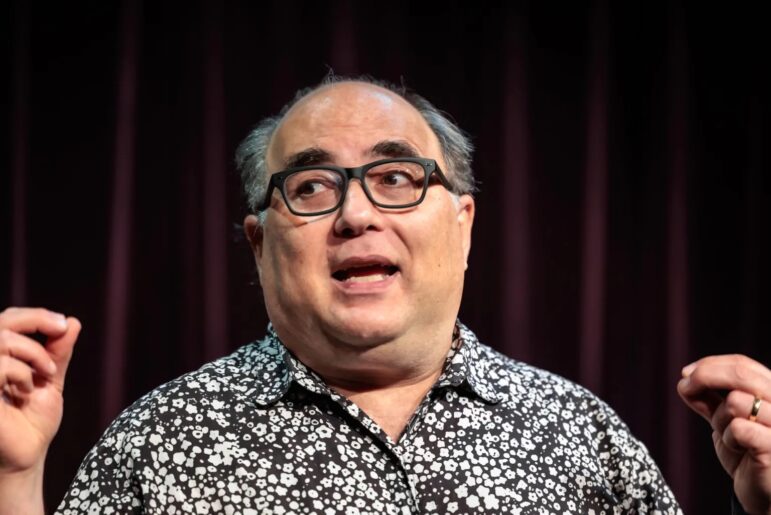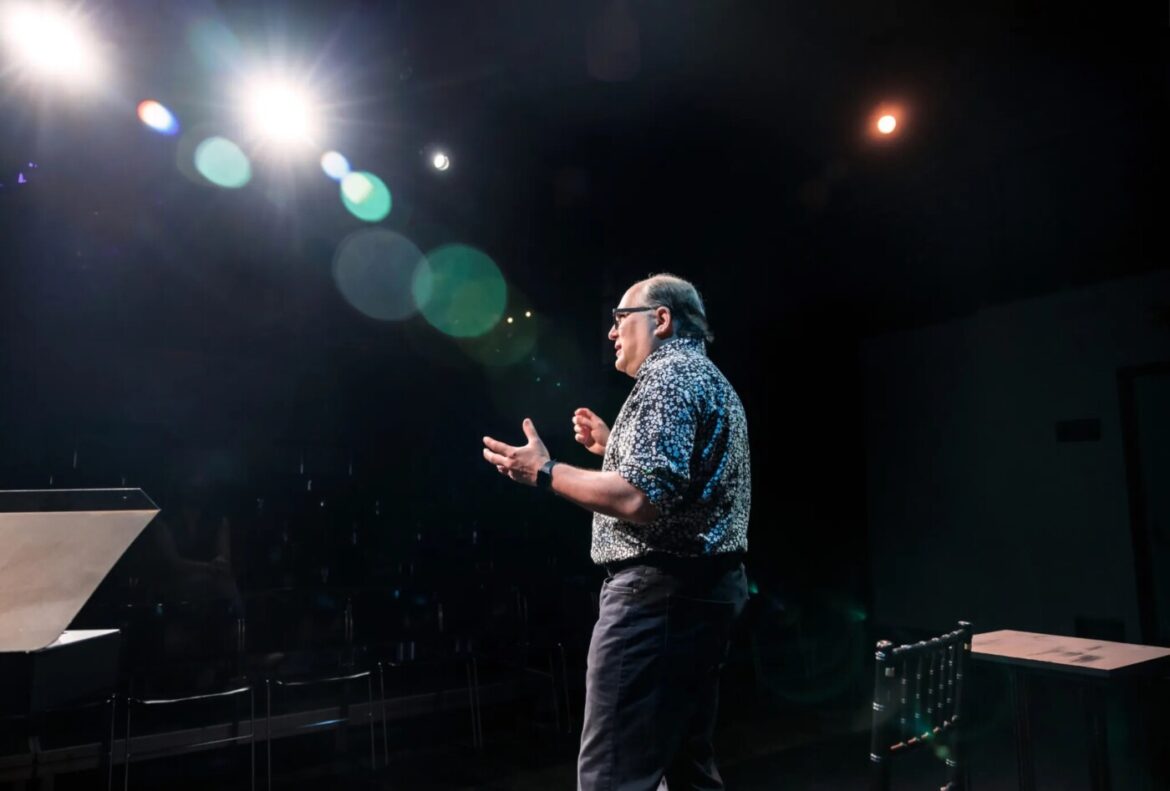“Brain science can help us save the world!” declares monologist and all-around funny guy Josh Kornbluth.
In his new solo show, “Citizen Brain,” premiering at The Marsh Berkeley, he makes a good case for his optimism.
A longtime writer-performer, Kornbluth recently spent two years as an Atlantic Fellow for Brain Health at the Global Brain Health Institute, based at University of California, San Francisco’s Memory and Aging Center as well as at Trinity College, Dublin. (The Institute, according to its webpage, is “dedicated to protecting the world’s aging populations from threats to brain health.”)
During his residency, Kornbluth focused on a 2012 discovery: that an actual empathy center exists in the brain (the anterior insular cortex).
As he immersed himself in his subject, attending meetings, lectures and classes and shadowing doctors and nurses on their rotations, he started to dream of a worldwide, peaceful revolution in which peoples’ individual empathy circuits would get stronger and stronger, allowing them to imagine themselves in others’ metaphorical shoes, inevitably uniting them across divisions of race, ethnicity, gender, social class.
As a GBHI fellow, his chosen pilot project, he says, was to launch this revolution.
The project also became the subject of “Citizen Brain,” or at least half of it: The show is both personal, as all his shows are, and — because he is an anointed Red Diaper baby — social and political.

Of course, being a Josh Kornbluth show, it’s both funny and serious.
Kornbluth has been premiering his solo works at The Marsh (“a breeding ground for new performance”) for decades, including “Haiku Tunnel,” which he and his filmmaker brother, Jacob Kornbluth, turned into a 2001 film. Among other live shows are “Citizen Josh,” which he toured in India; “Ben Franklin Unplugged,” “Love & Taxes” and many more.
He appeared in movies and for two years hosted “The Josh Kornbluth Show,” an interview series, on KQED-TV. Three of his autobiographical plays were published in “Red Diaper Baby: Three Comic Monologues.”
With collaborators he made a series of short and entertaining videos that reflect his studies at GBHI. He interviews experts and connects brain science and social justice, focusing on themes such as loneliness and ageism (watch at citizenbrain.org).
He also writes an online newsletter, “But Not Enough About Me,” in which he riffs about whatever hilarious thoughts he’s having (read at joshkornbluth.com).
Recently, in a phone chat from his Berkeley apartment, he discussed “Citizen Brain,” his GBHI experience and some personal stuff that’s not part of the show. Here are some edited excerpts:
How did you get involved with the Global Brain Health Institute?
I’d been an artist in residence at the Zen Hospice Project in San Francisco. Which was lifechanging. I was thinking, is there anything else cool I could do as a visiting artist? Then I remembered I have friends that have been visiting artists at UCSF’s Aging and Memory Center, performer Geoff Hoyle and poet Jane Hirshfield. So I sent an email out of the blue to Dr. Bruce Miller, the amazing, wonderful director of the Aging and Memory Center, asking if I could apply, and right away he said, “Come to my office.” They were looking for applicants for their first cohort for a new program [GBHI was established in 2015] and he invited me to apply. I told him I was terrible in every science class I took. He said they were looking for all kinds of people. [In Kornbluth’s cohort, as it turned out, there were psychologists and epidemiologists but also a photographer and a bluegrass fiddler.] They wanted people to spread the word about inequities in treatment of brain health around the world [through] storytelling. And really, I’m a storyteller.
I started my fellowship at the same time that Donald Trump was starting his presidency. [Giggles.] Oh my god, what’s happening to our democracy, was going on in my mind. And also, and this becomes a big piece: My mother had had this amazing love story. She fell in love in her 70s with this widower in his 80s. It was a communist fairytale! They were both communists. He was a retired union organizer in Chicago, Frank Rosen, a longtime political activist.
And just around the time I was starting my fellowship, Frank was diagnosed with Alzheimer’s. These two dementias were going on for me, one in my family life with Frank, one in our country, exemplified by Trump. So “Citizen Brain” is about me trying to deal with these two kinds of dementia, which in a sense came together for me.
You worked with two collaborators, playwright Aaron Loeb as dramaturg and director Casey Stangl.
The story and words are mine, but the structure, how it develops, is very much a collaboration.
You intended it to open it for Shotgun Players’ 2020 season?
Yes, Patrick Dooley [artistic director] wanted something that would address our political dread but maybe give us some hope, and would run before and after the election, the outcome of which of course we didn’t know. Then in March 2020 everything shut down. Shotgun eventually got together a shortened run on Zoom from my living room, which ran before and during the election, but truncated. I did a few shows in people’s backyards, which was fun. But this is the premiere. I’m thrilled The Marsh is producing it.
What happened with Frank?
He died at age 91 in 2016 in Chicago. I talk about that in the monologue, about what happens with me figuring out how to launch this revolution of empathy using brain science and going back and forth to Chicago because of my stepfather’s Alzheimer’s. Going back and forth between these two things.
Mom continued in assisted living [in Chicago, where they’d been living together] for a couple of years, but then she got Alzheimer’s and she passed away in March. I was with her. My last decade or so I’ve been immersed in studying about how to care for people in hospice [through the Zen Project] and with dementia and that stood me in good stead. I had beautiful times with Mom. Even toward the very end she knew who I was. She was still in there. We’d always say, “I love you.” [Clears throat]
The piece itself ends around the time my stepfather died.
I really open myself up in the show, that’s one thing about it, and why I’m looking forward to it. And there’s also the continuing political crisis which can make us feel at times hopeless and disconnected. It’s really important to me personally to be in a space, in this case The Marsh in Berkeley, with other people who are worried about the same things, and to tell a story that maybe can leave us feeling a bit hopeful. It has been a long period of feeling isolated, and it feels nice to come in out of that.
How is your own brain feeling these days?
OK. My 64-year-old brain is as sharp as ever, as goofy and weird, and as neurotic and confused and as lucid and unlucid as I’ve always been. My brain feels in pretty good shape for now, knock wood.
“Citizen Brain” continues at 5 p.m. Saturdays through July 29 at The Marsh Berkeley, 2120 Allston Way, Berkeley. Tickets are $25-$100. Visit themarsh.org.
